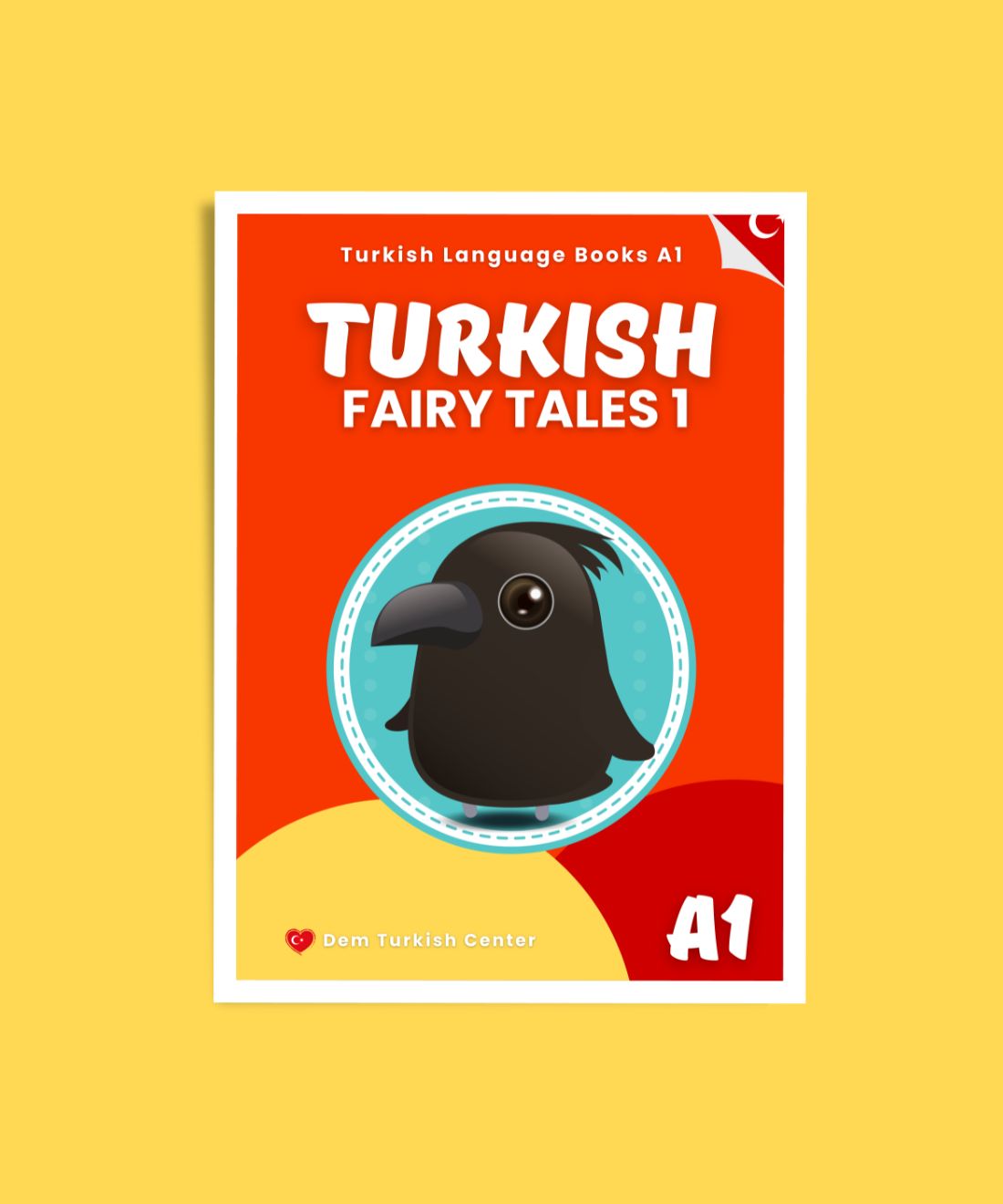
How to Speak Turkish Like a Native: Top 15 Tips (Podcast Interview)
Merhaba and welcome to the Dem Turkish Center's language learning podcasts!
Ever dreamed of moving beyond textbook Turkish and speaking with the effortless flow of a native?
That elusive goal is our focus today. We are thrilled to be joined by Dem Turkish Center, a premier resource for Turkish learners worldwide. They're here to unravel the secrets with her top 15 practical tips for authentic pronunciation, mastering cultural nuances, and using those little filler words that make all the difference.
Let's weave your way to fluency and discover how to truly speak Turkish like a native.
How to Speak Turkish Like a Native: Top 15 Tips with Dem Turkish Center
Listen to this interview about "How to speak like a native - Top Tips":
HOST Merhaba and welcome to "Language Loom," the podcast where we unravel the threads of language learning and weave them into fluency.
Today, we're diving into a language that bridges continents, a language of rich history, breathtaking poetry, and, as any learner will tell you, some fascinatingly unique challenges: Türkçe! That's Turkish.
Every language learner dreams of that magical moment when they stop sounding like a textbook and start sounding like a local.
But how do you cross that chasm?
How do you move from being understood to being mistaken for a native?
To help us answer that, We're absolutely thrilled to welcome Dem Turkish Center. Hoş geldiniz! Welcome to the podcast!
GUEST Merhaba! Çok teşekkür ederim. Thank you so much for having us. It’s a pleasure to be here on "Language Loom."
HOST The pleasure is ours! For our listeners who might not be familiar, can you give us a quick overview of what Dem Turkish Center is and your philosophy behind teaching Turkish?
GUEST Of course. Dem Turkish Center is a passion project born from a desire to make Turkish accessible and enjoyable for everyone, everywhere. We offer self-study courses, books, worksheets, and online classes for all levels, from absolute beginner to advanced. Our philosophy is simple: language is alive. It’s not just about grammar rules and vocabulary lists; it’s about communication, culture, and connection. We try to weave all of that into our materials, so our students don't just learn "about" Turkish, they learn to "use" it.
HOST That connection is so vital. And today, we’re going to get into the nitty-gritty of that. We’ve asked you to bring your top 15 tips for speaking Turkish like a native. This is gold dust for our learners! Shall we dive into number one?
GUEST Let’s do it!
Download Turkish language courses for self-study
Tip #1: Master the Turkish Vowel Harmony
HOST Tip #1: Master the Turkish Vowel Harmony. This seems to be the cornerstone of the language. Why is it so non-negotiable?
GUEST It truly is the heart and soul of Turkish melody! Think of vowel harmony as the rule that makes Turkish sound smooth and flowing, almost like a song. The basic idea is that a word’s vowels want to be friends and get along. They need to be either all front vowels (e, i, ö, ü) or all back vowels (a, ı, o, u). This harmony then dictates the vowels in suffixes you add.
For example, the suffix for "to" is `-e` or `-a`. So, for "ev" (house), which has a front vowel `e`, you add `-e` to make "eve" (to the house). For "Ankara," which has back vowels, you add `-a` to make "Ankara’ya" (to Ankara). Getting this wrong immediately marks you as a foreigner because it breaks the musical flow. It’s the first and most important habit to build. Listen for it in native speech – it’s everywhere!
Tip #2: Get the Pronunciation of Ğ (yumuşak g)
HOST It’s the rhythm of the language itself. Fantastic. Okay, Tip #2: Get the Pronunciation of Ğ (yumuşak ge). Right.* This letter is infamous. How do we tame this soft G?
GUEST Ah, the mysterious `ğ`! Its name, "yumuşak ge," means "soft g," and its key characteristic is that it’s "silent". It doesn’t make a sound itself. Instead, it acts as a lengthener for the vowel that comes before it.
- In "ağaç" (tree), it lengthens the `a` sound: "aaaç."
- In "eğitim" (education), it lengthens the `e` sound: "eeitim."
- After front vowels like `i`, it can sometimes create a very slight `y` sound, like in "değil" (not), which sounds like "deyil."
The biggest mistake learners make is trying to pronounce it like a hard `g`. Just remember: lengthen the previous vowel and let it flow. Listen to words like "yağmur" (rain) or "doğru" (right) and you’ll hear that beautiful elongation.
Download Turkish language lessons for self-study
Tip #3: Use Filler Words and Interjections
HOST That’s a huge help. Now, Tip #3: Use Filler Words and Interjections. This is how real people speak, right?
GUEST Exactly! Textbooks teach you perfect sentences, but natives speak in bursts, with pauses and fillers. Using these naturally is a huge leap towards sounding authentic.
- Şey… This is the universal "um..." or "uh...". "Nereye gidiyoruz? Şey… markete." (Where are we going? Um... to the market.)
- Yani… Means "I mean..." or "that is to say...". Used for clarification. "Çok yoruldum, yani hiç dışarı çıkmak istemiyorum." (I'm very tired, I mean, I don't want to go out at all.)
- Hadi ya! An incredibly common expression of surprise, like "No way!" or "Get out of here!"
- Vay canına! "Wow!" or "Holy cow!"
- İşte Means "here it is," "that's it," or even "you know." "İşte, bu yüzden gitmedim." (You see, that's why I didn't go.)
Sprinkling these into your conversation instantly makes you sound more relaxed and natural.
Tip #4: Learn the Nuances of "Şimdi"
HOST I love that. It’s the seasoning of the language. Tip #4: Learn the Nuances of "Şimdi." I understand it means more than just "now"?
GUEST Oh, yes. This is a classic example of a word whose textbook definition doesn't capture its soul. "Şimdi" can mean "now," but its usage is much broader.
It can mean "just a moment ago": "Şimdi geldi." (He just arrived.)
It can mean "in a little while": "Şimdi geliyorum!" (I'm coming in a sec!)
And it’s often used as a filler to start a sentence: "Şimdi, bu konuda…" (Now/So, about this issue...).
Understanding this fluid sense of time is key to understanding how Turks communicate.
Download Turkish language books for self-study
Tip #5: Understand the Use of "Aman" and "Haydi"
HOST Fascinating. Okay, Tip #5: Understand the Use of "Aman" and "Haydi." Two more small words with big meanings.
GUEST These are power-packed words!
- Aman This word carries so much emotion. It can mean "be careful!" ("Aman dikkat!"), "oh my god!" expressing worry or surprise ("Aman Allahım!"), or even "for heaven's sake!" ("Aman, yapma!" - Oh, don't do that!).
- Haydi (Sometimes spelled "hadi") is the ultimate word for motion and encouragement. It means "come on," "let's go," "go on." "Haydi gidelim!" (Let's go!), "Haydi, yapabilirsin!" (Come on, you can do it!). It’s energetic and essential for everyday life.
Tip #6: Embrace the Endearing Suffixes (-ce, -cik, -im)
HOST Perfect. Now, Tip #6: Embrace the Endearing Suffixes (-ce, -cik, -im). This is where Turkish gets really cute.
GUEST It does! Turkish uses suffixes to show affection, smallness, or endearment, and they are used constantly, especially with names and nouns.
- -cik / -cık is a diminutive that shows something is small or cute. "Kedi" (cat) becomes "kedicik" (kitty). "Ev" (house) becomes "evcik" (little house). With names: "Ayşe" becomes "Ayşecim."
- -ce is used for adverbs but also for endearment. "Benimle Türkçe konuşur musun?" (Will you speak Turkish with me?)
- -im (my) is added to names to show closeness. "Selin" becomes "Selin'im" (my dear Selin). "Anne" (mother) is almost always "annem" (my mother) even when you're talking to someone else, showing that special relationship.
Using these correctly shows you understand the emotional texture of the language.
Download Turkish language worksheets for self-study
Tip #7: Practice the Turkish "R"
HOST It really does add a whole new layer. Tip #7: Practice the Turkish "R". How is it different?
GUEST The Turkish `r` is a flap or a tap, like the Spanish `r` in "pero." It's made by quickly tapping the alveolar ridge (the gum behind your upper teeth) with the tip of your tongue. It's not the strong, rolling Scottish `r` nor the guttural French `r`. At the end of words, it's often very soft, almost silent. For example, "gider" (he goes) can sound like "gideh." Practicing this light, quick tap will make your accent much cleaner.
Tip #8: Use Idioms and Proverbs (Atasözleri ve Deyimler)
HOST Great advice. Tip #8: Use Idioms and Proverbs (Atasözleri ve Deyimler). This is the wisdom of the culture.
GUEST Absolutely. Using an idiom at the right moment is like a secret handshake; it shows deep cultural understanding. We have thousands!
- "Damlaya damlaya göl olur." (Drop by drop, it becomes a lake.) - Meaning: Little by little, you can achieve big things. (The equivalent of "Every penny counts.")
- "İşleyen demir ışıldar." (The working iron shines.) - Meaning: If you work, you succeed. (Similar to "A rolling stone gathers no moss.")
- "Gözünden uyku akmak." (To have sleep flowing from your eyes.) - To be incredibly sleepy.
Learning a few of these and using them appropriately will impress any native speaker!
Take Turkish practice classes online
Tip #9: Master the Question Particle "mı/mi/mu/mü"
HOST I can imagine! Tip #9: Master the Question Particle "mı/mi/mu/mü". This seems simple but is often misplaced.
GUEST It's a tiny word that causes big mistakes. The key rule is that it *follows* vowel harmony and is written "separately" from the verb.
You take the verb, say "neither" and then add the question particle. For example:
- "Geldi" (He came) - "Geldi mi?" (Did he come?)
- "Anladın" (You understood) - "Anladın mı?" (Did you understand?)
- "Güzel mi?" (Is it beautiful?)
The mistake is often mashing it together: "Geldimi?" is always wrong. It must be "Geldi mi?" That space is crucial!
Tip #10: Listen to and Imitate Turkish Music and Series
HOST Such a simple but important detail. Tip #10: Listen to and Imitate Turkish Music and Series. Why is passive immersion so powerful?
GUEST Your brain learns even when you're not actively studying. Listening to Turkish music, especially pop and folk music, trains your ear to the rhythm and melody. Watching Turkish TV series and movies—especially with Turkish subtitles—is a masterclass in natural conversation. You hear the filler words, the slang, the intonation, the emotional exchanges. You see the body language that accompanies the words. It’s invaluable. Start with shows like "Kurtlar Vadisi" for drama or "Leyla ile Mecnun" for comedy and incredible language play.
Tip #11: Use Contractions in Speech
HOST Brilliant. Tip #11: Use Contractions in Speech. Natives don't enunciate every syllable, do they?
GUEST Not at all! Spoken Turkish is full of contractions that make it faster and smoother.
- "Ne haber?" (What's news?) becomes "N'aber?"
- "Ne oluyor?" (What's happening?) becomes "N'oluyor?"
- "Burada" (here) often sounds like "burda."
- "Buradayım" (I'm right here) becomes "Burdayım."
Listening for these elisions and starting to use them will make your speech sound much less robotic.
Tip #12: Learn About Turkish Culture and Customs
HOST Tip #12: Learn About Turkish Culture and Customs. Language isn't just words.
GUEST One hundred percent. Language is a reflection of culture. Understanding Turkish hospitality, the importance of family, the concept of "gönül" (heart/soul), the ritual of tea drinking, the respect for elders—all of this informs "how" and "why" people speak the way they do. The language of invitation, refusal, gratitude, and greeting are all deeply cultural. When you understand the "why," the "what" makes so much more sense.
Tip #13: Practice with Native Speakers (and Don't Be Afraid to Make Mistakes)
HOST So true. Tip #13: Practice with Native Speakers (and Don't Be Afraid to Make Mistakes). This is the scary but essential part.
GUEST It's the most important tip for putting all the others into practice. You can know all the rules, but you need the real-time feedback and adaptation that only comes from conversation. Platforms like iTalki are great, but even better is finding a language exchange partner. Turks are generally very supportive and appreciative of anyone trying to learn their language. They will correct you kindly. Embrace the mistakes—they are proof you are trying!
Tip #14: Pay Attention to Body Language and Non-Verbal Cues
HOST Tip #14: Pay Attention to Body Language and Non-Verbal Cues. What should we look out for?
GUEST Communication is more than verbal. A few very Turkish cues:
- The "tsk" sound made by sucking air through the teeth. This can mean "no," "too bad," or "I don't agree."
- Raising the eyebrows and tilting the head slightly backwards can mean "no."
- A single click of the tongue can mean "no" or express frustration.
- The hand gesture for "wait" or "be patient" (fingers together, palm down, moving up and down).
Matching your body language to your words completes the picture.
Tip #15: Be Patient and Persistent
HOST And finally, Tip #15: Be Patient and Persistent.
GUEST This is the golden rule. Language learning is a marathon, not a sprint. Some days you'll feel like you're not progressing, but you are. Consistency is everything. Even 15 minutes a day of reading, listening, or reviewing is better than nothing. Celebrate the small wins—the first time you understand a joke, the first time you order food perfectly, the first dream you have in Turkish. These are all signs you are weaving the language into your mind.
HOST This has been an absolute masterclass. Thank you so much for sharing these incredible insights with us. It’s clear that Dem Turkish Center is built on a deep love and understanding of the Turkish language.
GUEST Biz teşekkür ederiz. It was truly a pleasure to talk about these nuances. We love what we do, and we’re always here to help anyone on their Turkish learning journey. Herkese kolay gelsin! (Good luck to everyone!)
HOST Listeners, you can find all of Dem Turkish Center’s amazing resources, including their courses, books, and information on classes, at their website, demturkishcenter.com. Links will be in the show notes.
That’s all for this episode of Language Loom. Thank you for listening. Kendinize iyi bakın! Take care of yourselves!














